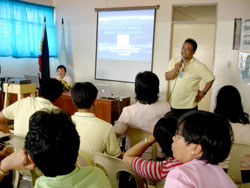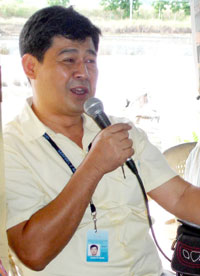SEAFDEC/AQD urges biosecurity for shrimp farms

SEAFDEC/AQD disease experts discuss viral
diseases.
In a recent biosecurity forum, Dr. Joebert Toledo, Chief of the Aquaculture Department (AQD) of the Southeast Asian Fisheries Development Center (SEAFDEC), has offered to provide shrimp farmers free diagnostic services as soon as they begin suspecting or experiencing a disease outbreak.
The forum entitled "Biosecurity aspects on common shrimp viral diseases" was attended by 27 shrimp farm operators, local government units (LGUs), and aquaculture companies. It was held in SEAFDEC's Dumangas Brackishwater Station (DBS) in Dumangas, Iloilo on May 31. The towns represented include Zarraga, Leganes, and Dumangas.
This was SEAFDEC's way of extending help to shrimp farmers in order to prevent losses from viral diseases. SEAFDEC conducts nested polymerase chain reaction (nested PCR) tests which can detect white spot syndrome virus (WSSV) among others. WSSV is the present scourge of the tiger shrimp industry.

SEAFDEC/AQD Chief Dr. Joebert Toledo
expresses his concerns about
biosecurity for shrimp farms.
The techno-forum was conducted to get a consensus among the Zarraga-Leganes-Dumangas shrimp farms on what to do when a viral disease hits one of them. The primary consideration is for the viral infection not to spread and for shrimp farms not to automatically drain the infected water to common waterways.
SEAFDEC experts Dr. Leobert dela Peña and Dr. Gilda Lio-Po lectured and discussed about shrimp viral diseases, their detection and prevention while DBS station head Ms. Jocelyn Ladja explained the biosecurity measures at the SEAFDEC station that shrimp farmers can adopt.
Last January 8 of this year, the Department of Agriculture lifted the 6-year ban on the importation of the Pacific white shrimp (Penaeus vannamei, locally known as suahe). About two weeks ago, DBS stocked the shrimp in some of its ponds. Without good management practices and proper biosecurity procedures, shrimp could be easily infected with several viral diseases such as white spot disease, taura syndrome, yellowhead disease, gill-associated virus, and the infectious hypodermal and hematopoietic necrosis.
Good management practices at the SEAFDEC station include the use of a settling and treatment pond, a reservoir stocked with fish, and a filtration system. The biosecurity measures include a disinfecting tire bath for vehicles entering the farm, and a footbath and hands disinfection for farm personnel. Visitors are no longer allowed at touching distance to ponds with shrimp stock. Bird scaring devices and crab fences are also installed because these animals are possible carriers of viruses. Each pond has its own designated equipment (feeding trays and boat, secchi disc, refractometer, basins, and sampling materials) which are not used in any other pond.
In case a disease outbreak is suspected, the shrimp farmers agreed to immediately go into proactive monitoring and alert neighboring shrimp farms. At the same time, contaminated water from the affected ponds should not be drained. The Municipal Agriculturist's Office (MAO) should also be informed for proper documentation and for proper coordination with concerned agencies such as SEAFDEC and the Bureau of Fisheries and Aquatic Resources (BFAR).
SEAFDEC/AQD may be contacted at its Dumangas Station thru tel. no. (033) 527-3016 or the Fish Health Section at (033) 336 2965. More information can be found on its website http://www.seafdec.org.ph.
